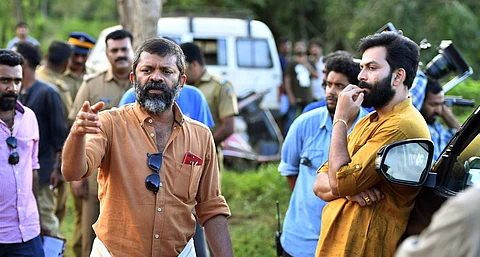

Ayyappanum Koshiyum (AK), Sachy’s second directorial feature after Anarkali (2015), is running to packed houses even in its third week of release. This is Sachy’s second consecutive hit after the Driving Licence (which he only wrote). He is into making films that appeal to a wider audience. “I would like to try an experimental film someday, but not anytime soon,” says the lawyer-turned-filmmaker, who has proved, with Anarkali and AK, that it’s possible to make a good mainstream film sans the usual cliches.
Excerpts from an interview:
How different is your approach to writing a script for yourself and for another director?
Other directors have their sensibilities and preferences which one has to keep in mind while writing scripts for them. The format I adopted for a Joshiy film is different from that for a Shafi film. Naturally, there is a lot of liberty when directing my own scripts. If you take Ayyappanum Koshiyum, the audience can’t tell who the hero or villain is, and yet, they’re with them throughout the film. If I took this story to other directors, they probably wouldn’t accept it because they don’t want any ambiguities. For me, the priority is that the audience stays with the film, no matter how the characters are.
Anarkali, Driving Licence, and AK now feel like a trilogy because the films explored, in varying degrees, the conflict between two main characters.
Sometimes you don’t need a big story to make a film; an incident is enough. The reasons need not necessarily be big. However, if a character with a particular attitude treats it like a big issue, then that’s enough for things to get serious. In Driving Licence, one character’s self-respect is impacted by someone he loves and admires whereas, in AK, the conflict is between two strangers. As far as Koshy (Prithviraj) is concerned, it’s his right to keep in his possession his quota of booze. The character was inspired by a real-life person whom I helped out during my law days. Ayyappan (Biju Menon) is right too because he is simply enforcing the law. So, the clash of two rights is why all hell breaks loose.
In my initial story, there was only Koshy and his driver—the story was about Koshy and his driver surviving a particular situation. When Ayyappan and the cops came into the script, the story took a whole different course and brought in several other factors and characters.
After seeing the film, one can’t imagine any Malayalam superstar other than Prithviraj in the role of Koshy...
You see, when a star becomes concerned about their significance in the film, it becomes a problem. But things are changing now. The good thing about the younger generation in cinema today is that a film and its characters are more important to them than the heroism. For example, Fahadh Faasil played the villain in Kumbalangi Nights. It’s a big deal for cinema when everyone thinks like that.
Was the film shot in the order it was written?
No. The circumstances were such that we couldn’t shoot the film in sequential order. The weather posed a challenge, plus, we had to take into account the fact that we could shoot in a particular location for which we had the authorisation on that particular day.
The women in AK get sufficient space to perform. Would the film have worked if they had more space than they have now? Suppose this film was about the rivalry of two women, do you think it would’ve been as successful?
I don’t think so. This is show business, after all, and it’s all about capital. A producer agrees to do a film only if there is a bankable star. Imagine this film with two of Malayalam’s top female stars. The television channels wouldn’t be interested in buying the rights, and then they go on and hold debates about the absence of female-oriented films. We should be first asking the channel heads if they would be willing to buy the rights of such films. If they would, then we can make more women-centric films.
The characters in your scripts speak in a unified language. Have you ever tried to incorporate different dialects?
No. Most of my films take place in the metros or have urban-centric stories and characters. As it was not important which region the characters came from, the diction or rendering was not important. Hence, the unified language. I could’ve actually tried something different in AK, but then asking the supporting characters also to speak in an unfamiliar dialect would make things complicated. The focus on the diction will affect their performance.
What can you tell us about your future projects?
I’m developing a script for the directorial debut of Jayan Nambiar, who worked with me as an associate director on AK and Anarkali as well as Prithviraj’s associate in Lucifer. After that, I’ll be directing a script not written by me. I hope to start shooting it by July-August. And then I’m writing and directing a big-scale project by the middle of next year.